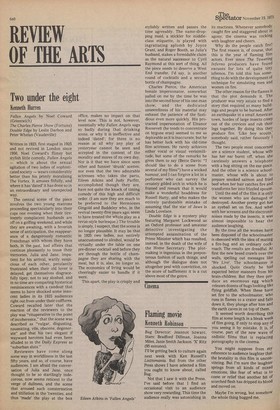REVIEW OF THE ARTS
Two under the eight
Kenneth Hurren
Fallen Angels by Noel Coward (Greenwich) The Charles Pierce Show (Fortune) Double Edge by Leslie Darbon and Peter Whelan (Vaudeville) Written in 1923, first staged in 1925 and not revived in London since 1950, Noel Coward's flimsy but stylish little comedy, Fallen Angels — which is about the sexual agitation of two ladies of sophisticated society — wears considerably better than his primly moralising The Vortex. It amuses fitfully, and where it has 'dated' it has done so in an extraordinary and unexpected way.
The central scene of the piece involves the two young matrons proceeding spectacularly into their cups one evening when their tiresomely complacent husbands are off on a golfing weekend, and while they are awaiting, with a feverish sense of anticipation, the reappearance of a dangerously romantic Frenchman with whom they have both, in the past, had affairs that continue pleasantly to tease their memories. Julia and Jane, impa' tient for his arrival, warily suspicious of each other, petulantly frustrated when their old lover is delayed, get themselves disgracefully tipsy, not to say sloshed, and in no time are comparing hysterical reminiscences with a candout that seems to have shocked some innocent ladies in its 1925 audiences right out from under their coiffures. Coward recalled later that the reaction of the reviewers to the • play was "vituperative to the point of incoherence," that the scene was described as "vulgar, disgusting, nauseating, vile, obscene, degenerate" and that his two elegant if wayward heroines had even been alluded to in the Daily Express as "suburban sluts."
Reviewers have come along some way in worldliness in the last fifty years, and so, of course, have audiences. I am afraid the conversation of Julia and Jane, once thought to be so startlingly indecorous, now seems reticent to the verge of dullness, and the scene that aroused such consternation and titillation in the 'twenties, and thus 'made' the play at the box
office, makes no impact on that level now. This is not, however, essentially why Fallen Angels sags so badly during that drinking scene, or why it is ineffective and indeed 'dated'; for there is no reason at all why any play of yesteryear cannot be seen and accepted in the context of the morality and mores of its own day. Nor is it that we have since seen other and funnier 'drunk' scenes; nor even that the two admirable actresses who takes the parts, Eileen Atkins and Judy Parfitt, accomplished though they are, have not quite the knack of timing comedy of this high and difficult order. (I am sure they are much to be preferred to the Hermiones Gingold and Baddeley who, in the revival twenty-five years ago, seem to have treated the whole play as a revue-style burlesque.) The trouble is simply, I suspect, that the scene is no longer plausible. It may be that in 1925 two ladies, not entirely unaccustomed to alcohol, would be virtually under the table on one pre-dinner cocktail and before they are through the bottle of champagne they are sharing with the meal, but it is, alas, no longer so. The economics of living would be cheeringly easier to handle if it were.
This apart, the play is crisply and stylishly written and passes the time agreeably. The name-dropping maid, a stickler for middleclass etiquette, is played with ingratiating aplomb by Joyce Grant, and Roger Booth, as Julia's husband, stakes a formidable claim as the natural successor to Cyril Raymond at this sort of thing. All the piece needs to deserve a West End transfer, I'd say, is another round of cocktails and a second bottle of champagne.
Charles Pierce, the American female impersonator, somewhat palled on me by the time he was into the second hour of his one-man show, and the dedicated unseemliness of his material may exhaust the patience of the fastidious even more quickly. His protracted impersonation of Eleanor Roosevelt (he tends to concentrate on bygone eras) seemed to me as deplorable as it is inaccurate, but he has better luck with his old-time film actresses. He rarely achieves either vocal or visual verisimilitude, but some of the remarks he gives them to say (Bette Davis: "I should like to do a scene from several of my films") have a wicked humour, and I can forgive a lot in a performer who can survey the ornately gilded arch in which he is framed and remark that it would make a wonderful headdress for Russell Harty, and who makes the entirely pardonable mistake of assuming that the star of Jaws is Linda Lovelace.
Double Edge is a mystery play featuring Margaret Lockwood as an Oxford professor and amateur detective investigating the attempted assassination of the Prime Minister which has resulted, instead, in the death of the wife of the Home Secretary. The plotmaking is ingenious in the preposterous fashion of such things, and although the dialogue does not altogether peal with conviction, on the score of bafflement it is a cut above most of the genre.


































 Previous page
Previous page